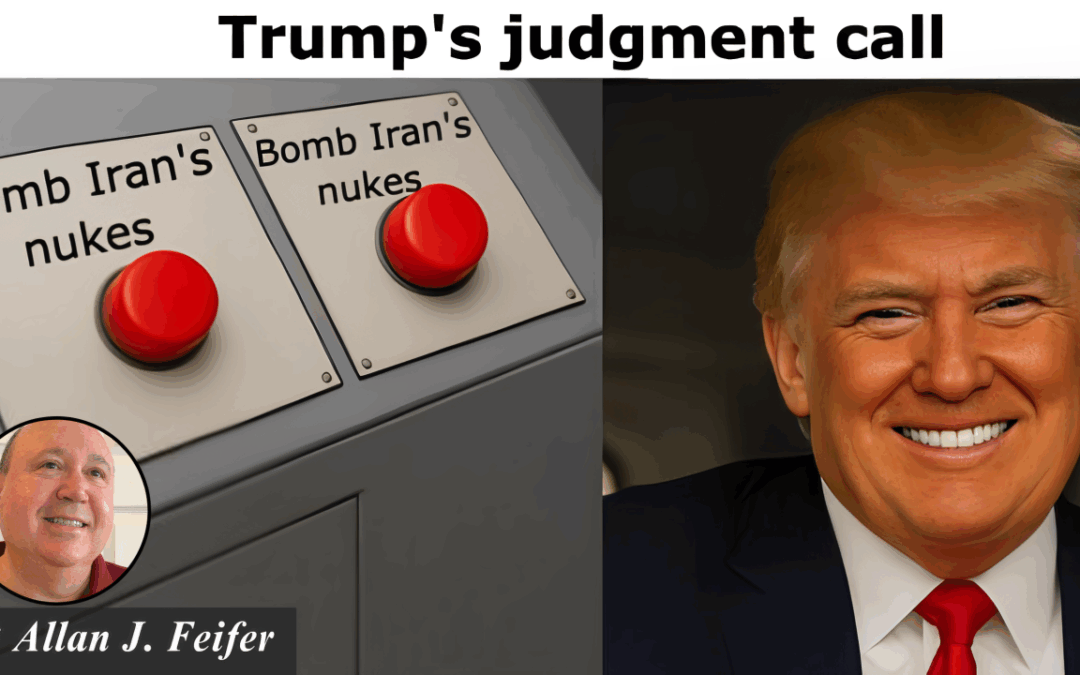There are almost no situations in which a presidential administration knows or has all the relevant information concerning a geopolitical adversary. Instead, the administration, relying on known facts and extrapolated theories, must apply judgment to its ultimate conclusions. Too many, however, don’t want to recognize this reality and insist that Trump and his team are reckless if they act upon anything but full and perfect information.
Americans are famous for their Monday Morning Quarterbacking. Heck, we invented the term. As I write this on Monday morning last, I witnessed the key question of the moment—was Iran in the hunt to make an atomic bomb? In Face the Nation Sunday, Margaret Brennan interviewed Senator Marco Rubio with this terse exchange implying that it was impossible for the president to have legitimately or legally chosen a valid course of action:
“Are you saying that the United States did not see intelligence that the supreme leader had ordered weaponization?” Brennan asked of Rubio’s use of the word “ambitions.
“That’s irrelevant,” Rubio argued.
“That is the key point in US intelligence assessments,” Brennan shot back. “You know that.”
“No, it’s not,” Rubio said.
“Yes, it was!” Brennan replied.
“I know that better than you know that, and I know that’s not the case,” Rubio quipped, adding, “You don’t know what you’re talking about.” “I’m asking you whether the order was given,” Brennan explained.
“It doesn’t matter if the order was given,” Rubio said. “They have everything they need to build nuclear weapons.”
Rubio later took issue with Brennan’s line of questioning, arguing, “That’s not how intelligence is read.”
“That’s not how intelligence is used,” he insisted.
Thank God that Brennan is not our President! We just had a president who thought that way (when he was sentient). There’s an old joke in the military that puts the issue of being close does not cut it in some situations:
Close only counts in horseshoes and hand grenades.” And, I might add, nuclear devices!
Inadvertently, Brennan touched on the key point for which every president is tested at one point or more during his administration—judgment. Brennan’s questions presuppose that a president (or, at least, a Republican president) must have perfect knowledge. Any less, and Brennan’s default position would be to do nothing. According to her line of questioning, taking consequential actions without certainty amounts to an impeachable offense.
Thank God that Brennan is not our president!
Bipartisan Critics Question Trump’s Decision:-
Brennan is not the only one. Immediately after the strike on Iran’s nuclear facilities, most on the left and some on the right claimed that President Trump was somehow ill-advised and did not have enough information to inform his decision to attack Iran’s nuclear infrastructure.
Democrats and ostensibly conservative naysayers appear to be religiously attached to two concepts at the moment:
- Anything Trump wants or does is bad and must be repulsed
- Symbolism has replaced actual knowledge and intelligent deduction that might require decisive actions
Even after losing an election, Democrats continue to pound on the same concepts and alienate at least 75% of Americans on at least some subjects, if not all. It’s helpful to look back at the consequential actions of recent previous presidents, and you will discover that Republican administrations since Reagan act more often when under threat than Democratic ones:
- Reagan acted against Grenada when Cuba had designs on that island nation
- George HW Bush acted against Panama in ’89 and put together a winning coalition to stop Iraq after it invaded Kuwait in ’91
- George W Bush made the call to go into Afghanistan in ’01 after we were hit, and then Iraq in ’03.
- Trump took out General Soleimani in 2020
The lone exception was NATO’s toppling of Gaddafi in Libya in 2011, which the U.S. led along with 19 other NATO nations. Other than that, Obama was famous for “Leading from Behind.”
My recent article on “The fatal flaws in the America Firsters’ analysis” led me to conclude we’ve strayed from confronting facts that should inform us (sometimes imperfectly) of likely outcomes, which should proscribe necessary actions to be taken. We can and should debate whether it is wise and essential to unsheathe our swords on specific issues, often with imperfect intelligence. Still, the corollary is that doing nothing can lead to bad outcomes just as frequently, if not more so.
Given that no information about an enemy is perfect, all functional administrations must confront facts that should inform us (sometimes imperfectly) of likely outcomes, and then apply their judgment to determine the necessary actions to be taken. Doing nothing in every situation where there is less than complete information—which is what the president’s opponents are now insisting is the only safe course—can and does lead to bad outcomes just as often as action itself.
Conclusion:-
Iran is not a good actor. We know that because of what it’s said and what it’s done for the past 46 years. And if bad actors boast that they intend to bring total destruction to their enemies, we must take them at their word. When Saddam Hussein said he had weapons of mass destruction, it was reasonable to believe him. The mistake was in trying for full-scale regime change, not in believing his bluster. Looking back at history, all megalomaniacal dictators have clearly signaled their intentions, and doing nothing was a green light for them.
There are few things in this world as consequential, unknowable, and potentially destabilizing as nuclear weapons in the hands of madmen. Didn’t we learn our lesson with North Korea, which invented the art of deception, false promises, sleight of hand, and a maniacal commitment to achieve nuclear weapon parity to ensure the regime’s survival, or, in the case of Iran, to destroy every living Jew they can?
Author, Businessman, Thinker, and Strategist. Read more about Allan, his background, and his ideas to create a better tomorrow at www.1plus1equals2.com. Read additional great wri




Recent Comments